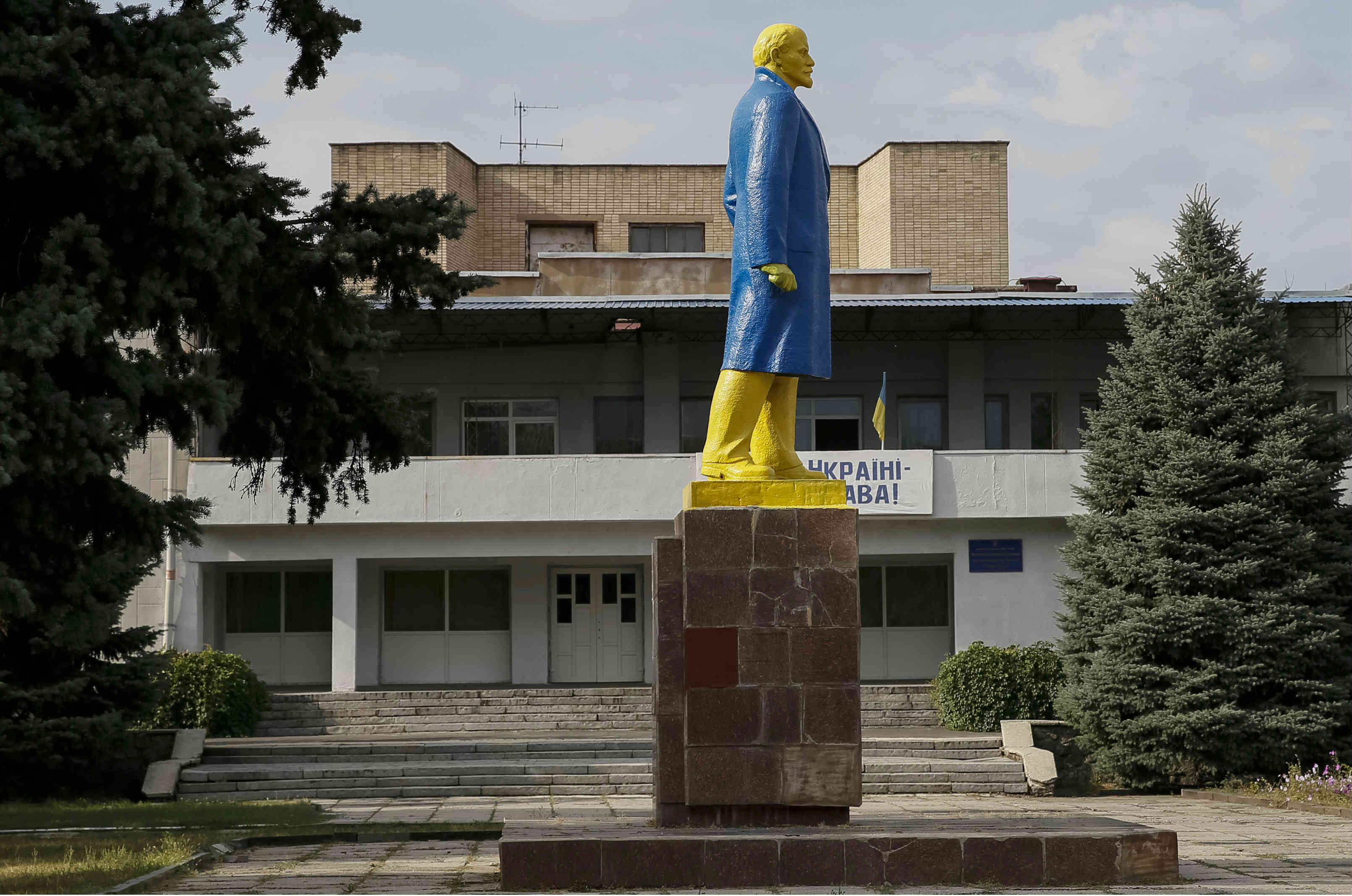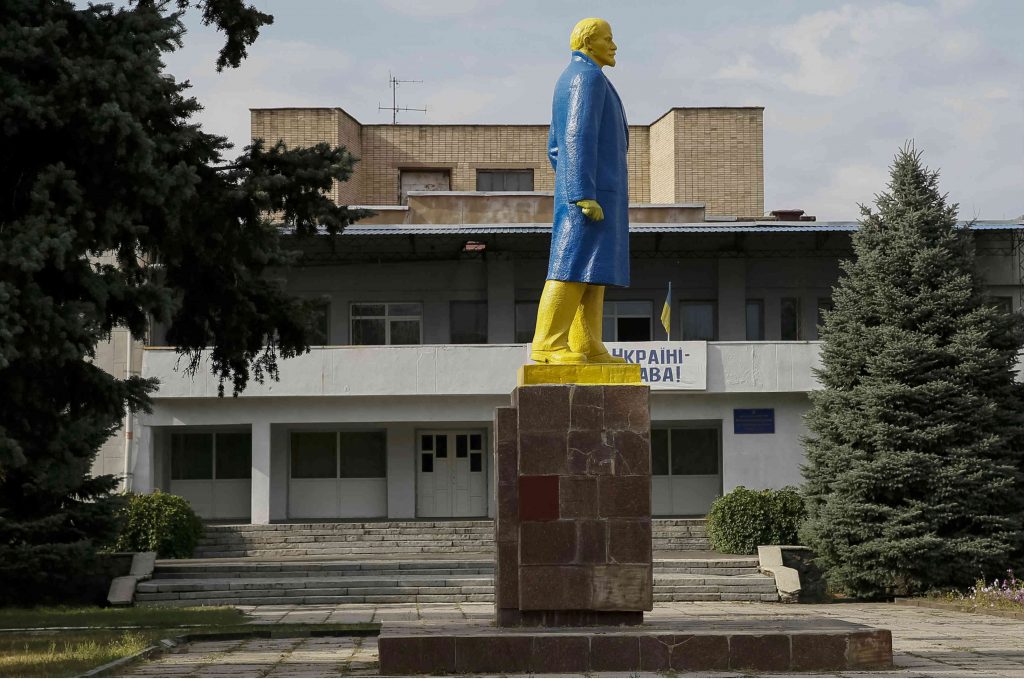 On November 25, 2010, while on a state visit to Kyiv, Israel’s President Shimon Peres stated that, “If Ukrainians were to ask me for advice, I would say: forget history.” Coming from the president of a country steeped in history, the comment was at first glance bizarre. Directed at a country embroiled in seemingly endless contentious debates over its history, the advice was at second glance intriguing. But can history be forgotten? And would forgetting be desirable, even if possible? And what would forgetting mean for a country such as Ukraine, which hopes to put its Soviet past behind it while discovering the neglected pages of its history?
On November 25, 2010, while on a state visit to Kyiv, Israel’s President Shimon Peres stated that, “If Ukrainians were to ask me for advice, I would say: forget history.” Coming from the president of a country steeped in history, the comment was at first glance bizarre. Directed at a country embroiled in seemingly endless contentious debates over its history, the advice was at second glance intriguing. But can history be forgotten? And would forgetting be desirable, even if possible? And what would forgetting mean for a country such as Ukraine, which hopes to put its Soviet past behind it while discovering the neglected pages of its history?
Two thought experiments
Imagine what a society that forgets all history and its opposite—a society that remembers all history—would look like. The former would be even more nightmarish than George Orwell’s 1984. After all, Orwell’s state needed history. It manipulated history by continually rewriting it to meet the political needs of Big Brother. A society that forgets history would have to destroy every single book, journal, article, blog, recording, film, and artwork no later than one day after it appeared. Such a society would live in the moment and be engaged in an unceasing attempt to obliterate everything that could serve as memory.
A society that remembers all history would, like Jorge Luis Borges’s “Funes the Memorious,” be equally dystopian. This society would not only preserve every single text—whether written, painted, filmed, or recorded—but it would have to record every conversation, every whisper, and every thought. It would have to incorporate every single recorded text into a continually evolving grand historical narrative.
Fortunately, neither of these societies is possible. An utterly remembering society is impossible, as a complete historical narrative could never assimilate an infinite number of facts. An utterly forgetful society is just as impossible, as it would entail a logical contradiction: forgetting how to remember.
National narratives
There is another barrier to forgetfulness, one specific to Ukraine and other post-colonial nations. In order to forget history, one must first remember it. And in order to remember history, one must first have a history of the nation’s development over time: a national narrative. Newly independent nations and states have a proclivity for these types of narratives, as independence creates a particular vantage point for history writing, demands that national narratives provide legitimacy for the new nations and states, and enables formerly oppressed peoples to find their voices and recover their memories.
There are three possible types of national narratives. First is a history of the national state. That entails tracing all the political formations that contributed to the emergence and consolidation of the administrative and coercive apparatus known as the state. Second is a history of the people, or nation. That entails tracing all the social, economic, political, and cultural developments that led to the emergence and consolidation of a self-conscious ethno-cultural community. Third is a history of the territory associated with the state or people. That entails tracing the relationships between all the peoples inhabiting that territory.
Which of these national narratives is best? Other things being equal, they are all equally good or bad as historical narratives. If the historians do their homework, write with integrity, and arrange genuine facts in logically coherent chronological narratives, each resulting narrative is valid. But is not the very notion of national narratives passé? Shouldn’t truly serious historians develop non-national or post-national narratives that boldly venture into spaces outside the state and the nation? Isn’t that kind of history intrinsically better? As we shall see, the answer is no.
Danto on history
The late philosopher Arthur Danto asked whether an “ideal chronicle” consisting of every single historical fact would amount to a genuine history. His answer was that an infinitely large collection of facts would not and could not be a usable historical narrative. Why not? For the simple, if somewhat counterintuitive, reason that complete comprehensiveness is antithetical to history. In reality, every history is and has to be partial and “slanted”; every history is and has to be a story. And stories are always stories, never of everything, but always of something with a beginning, middle, and end. As a result, all historians write intrinsically imperfect and incomplete narratives from particular vantage points reflective of their place in time. Every history is thus a never-ending work in progress, because the vantage point of the historian can never be frozen in time.
Although Danto’s view of history may appear to coincide with postmodernist claims about indeterminacy, meaninglessness, subjectivism, and relativism, it is actually rooted in fairly traditional understandings of history. Facts exist in Danto’s reading, and historians are able to determine what they are. Historians must therefore pay obeisance to chronological time, produce coherent narratives, and demonstrate that the facts they present are statements that, by virtue of their being supported by persuasive evidence, actually correspond to reality.
Histories can therefore give “objective” accounts of what happened, but they can never be full or final accounts produced from some transcendental vantage point. Multiple incomplete histories of anything are as inevitable and unavoidable as multiple lines intersecting a point. A feminist history can therefore be as good or as bad, as a historical narrative, as an anti- or non-feminist history. A nationalist or national history can, by the same logic, be as good or as bad as an anti-nationalist, non-national, post-national, or transnational history.
It follows that dominant, or hegemonic, historical narratives are not necessarily better as coherently organized chronological arrangements of facts. They only appear to be better because we—or, more precisely, historians and reading publics—deem them better. Certain histories strike us as better than others because they are more relevant to present-day concerns or more reflective of present-day views or norms. Thus, a feminist history may strike us as a better reading than a non-feminist history, but that is so, not because reality is demonstrably feminist, but because, inspired by feminism, we look for, and find, feminist facts in the story “as it really was.”
The hegemony of dominant narratives transforms non-dominant narratives into unwelcome shifts that rock the boat. New, non-dominant narratives will always appear as upstarts that threaten to upend the only “correct” way of seeing things. Feminist and African-American histories were treated in just this manner until they became part of the mainstream. Similarly, the histories of all formerly colonized nations were in opposition to the hegemonic narratives generated by the former empire or by elites, groups, or professions with established historical narratives.
Ukrainian narratives
Although Ukrainian historians have produced histories since at least the nineteenth century, they have never had the status of dominant narratives. As a result, Ukraine became independent in 1991 in a historical and historiographical setting of hegemonic non-Ukrainian narratives that had acquired institutionalized status over the course of decades or centuries. Emergent Ukrainian national narratives necessarily challenged the primacy of the historical status quo represented by existing dominant narratives.
Logically, emergent Ukrainian narratives had to correspond to the above three types of national narratives. Thus, a Ukrainian state narrative would necessarily begin Ukraine’s history in Kyivan Rus’. It would carry it through the Cossack rebellions of Bohdan Khmel’nyts’kyi and Ivan Mazepa, the failed attempt to build a state in 1917-1921, and the activity of the integral nationalists of the interwar period and World War II. And it would conclude with the development of the Ukrainian SSR, the collapse of the Soviet Union, and the role therein of Ukrainian national Communists and dissidents.
A Ukrainian people narrative would have the same historical sweep as the state narrative, while focusing on how state-building, together with developments in the society, culture, and economy, led to the emergence of nationally conscious Ukrainians and, eventually, a distinctly Ukrainian nation.
Finally, a Ukrainian territory narrative would tell the story of relations between and among peasants, landlords, merchants, workers, Ukrainians, Russians, Poles, Jews, Ruthenians, Catholics, Orthodox, and others in the territory of Ukraine.
Obviously, historians cannot ignore controversial individuals, organizations, or parties—be they nationalist, Stalinist, fascist, or liberal—in the writing of any kind of Ukrainian national narrative. Whatever their failings, these individuals, organizations, or parties played critically important, and arguably constructive, roles in the twin projects of Ukrainian state- and nation-building. To incorporate controversial figures into a Ukrainian national narrative is not to whitewash them. It is simply to tell the history of Ukraine as an ontologically legitimate story with a beginning, middle, and end embedded in a distinctly Ukrainian historical narrative—and not as a footnote in or disruption of non- or anti-Ukrainian historical narratives.
Such an approach entails a serious responsibility: to write Ukrainian national narratives honestly and with integrity—by eschewing hero-ization, demonization, casual myth-making, and obsessive myth-busting, by rejecting blank spots, and by addressing head-on all difficult, painful, complex, and embarrassing issues. The only way to counter popular depictions of Ukrainians as negations (as anti-Russians, anti-Soviets, anti-Semites, and thus as anti-human Untermenschen) is not to glorify them as Übermenschen, but to depict them as Menschen—as human beings capable of both good and evil, rationality and irrationality, and identical in these respects to all other human beings.
Taking Ukrainian history for granted
For Ukraine to develop a “normal” relationship to history—one that might satisfy President Peres, historians, and Ukrainians—it must still go through two stages. Ukraine must first construct a national history or histories. Thanks to the Euromaidan and the 2015 laws on de-communization, the freedom to produce such narratives finally exists.
It is only after such national narratives are constructed and consolidated that Ukrainians will be able to move on—not forget per se, but stop obsessing about the past. Once Ukrainian national narratives become routinized and naturalized, they will lend themselves to commercialization, kitschification, satirizing, and the like. We will know that moment has arrived when a Ukrainian version of Mel Brooks’ The Producers features “Springtime for Lenin” in Kharkiv and “Springtime for Bandera” in Lviv. Hollywood-ization will transform sacred historical narratives into mundane and secular artifacts and thereby enable the vast majority of the population to deal with history in the manner that it deserves—as the past and not the present, and as a taken-for-granted component of one’s national identity.
Taken-for-grantedness will also take history out of the realm of society or the state and place it in the realm in which it is most suitably obsessed over—that of professional historians, who do not and cannot take history for granted. That, of course, is what President Peres really had in mind—that Ukrainians should let their historians worry about history. Peres was wrong to think that could happen at this point in Ukraine’s historical and historiographical development. But once Ukraine catches up and has a history, Ukrainians will finally be able to forget it.
Alexander Motyl is a Professor of Political Science at Rutgers University-Newark.
Image: A monument of the Soviet state founder Vladimir Lenin painted in colors of the Ukrainian national flag is seen in the center of the eastern town of Velikaya Novoselovka in Donetsk region September 11, 2014. Credit: REUTERS/Gleb Garanich
